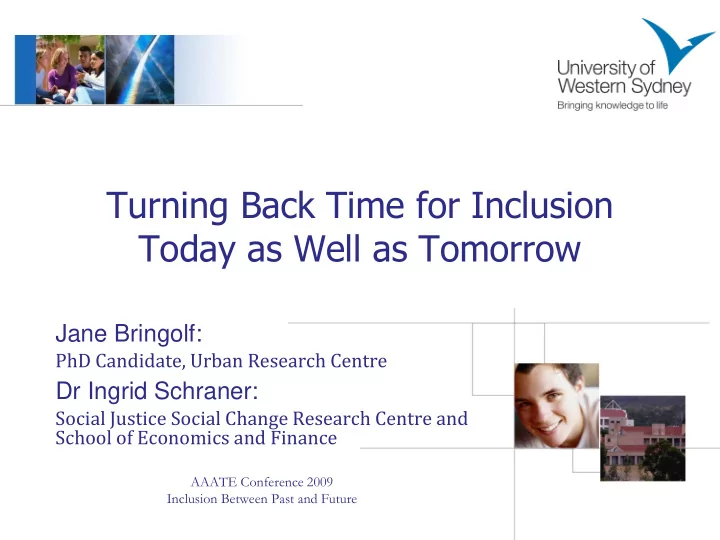

Turning Back Time for Inclusion Today as Well as Tomorrow Jane Bringolf: PhD Candidate, Urban Research Centre Dr Ingrid Schraner: Social Justice Social Change Research Centre and School of Economics and Finance AAATE Conference 2009 Inclusion Between Past and Future
from Lewis Carroll’s, Alice Through the Looking Glass. “When I use a word”, Humpty Dumpty said in a rather scornful tone, “it means just what I choose it to mean – neither more nor less.” “The question is”, said Alice, “whether you can make words mean so many different things.” Bringolf and Schraner AAATE 2009
Overview • Argues a difference between inclusion and inclusiveness – a language/thinking nexus • The two have different methodological standpoints – ask different questions • Benefits from separating the ideas – both can be explored Bringolf and Schraner AAATE 2009
What do words mean? • What is the difference between inclusion and inclusiveness? • How do their underpinning assumptions differ? • What does it mean for policy and practice? • What is the benefit in seeing them as two separate endeavours? Bringolf and Schraner AAATE 2009
Inclusion • Added to something existing • Incremental process • Giving to others • “Let them in” approach • Focused on otherness • Future-focused social aim Bringolf and Schraner AAATE 2009
Concept of inclusion identifies an excluded group Included Excluded Bringolf and Schraner AAATE 2009
INCLUSION Us looking at Them Them Us Now we have to include them Bringolf and Schraner AAATE 2009
INCLUSION Us looking at Them maintains language: Accessibility Ageing Design-for-all Disability Us Them Bringolf and Schraner AAATE 2009
INCLUSION Including one by one Overcoming exclusion Them Us Bringolf and Schraner AAATE 2009
Inclusiveness • Part of the whole from beginning • Holistic thinking • No ‘us and them’ • Everyone gets something • No-one left out approach • Focus on here and now • Power struggles minimised Bringolf and Schraner AAATE 2009
INCLUSIVENESS Looking at everyone Bringolf and Schraner AAATE 2009
INCLUSIVENESS Looking at everyone Bringolf and Schraner AAATE 2009
Inclusion • Supports notions of ‘doing our best’ over time (for them) • Therefore some exclusion is OK • Becomes future focused endeavour • Costs remain a constant in arguments • Benefits are ignored or discounted • Leads to tacked on solutions Bringolf and Schraner AAATE 2009
Inclusiveness • Supports a whole population approach – no ‘us and them’ • Some exclusion is not OK • Requires a commitment to fix now • Not of the future, but of today • Economic arguments viewed differently - benefits as well as costs • Solutions viewed differently – the whole Bringolf and Schraner AAATE 2009
Research, policy & practice • A vision of inclusiveness promotes thinking from a wider perspective • Unity and common ownership • Creates space for different avenues of thinking to surface • Focus on outcomes not rights Bringolf and Schraner AAATE 2009
Research, policy & practice • Not a contest between groups • ‘Us’ not giving something to others (them) • Not “Can we do it?” but “How will it be done?” • Cost of not doing is measured • All costs and all benefits measured Bringolf and Schraner AAATE 2009
Different standpoints • Inclusion and inclusiveness view the world from different perspectives • Inclusion looks outward across a social divide towards those excluded • Rights-based term sanctions notions of burdens on public and business purses • Attitude change unlikely • A socially negotiated process Bringolf and Schraner AAATE 2009
Different standpoints • Inclusiveness looks at the population as a whole and ensures all are included • As a term of equity it is not a socially contested process • Being inclusive is everybody’s business, not someone else’s business • Redress the exclusion built into the fabric of environments, products, and practices Bringolf and Schraner AAATE 2009
In a nutshell… • Inclusion – OK, didn’t get it right in the past but will get it right in the future • Inclusiveness – Go back in time to tackle consequences of what happened in the past – bring up to date with today’s practice and ethos • When saying “costs too much” someone is still paying the bill Bringolf and Schraner AAATE 2009
A vision of one whole population inevitably demands that we turn back time, visit and remedy the past, so that inclusiveness is manifest today as well as tomorrow. Bringolf and Schraner AAATE 2009
Contact details: Jane Bringolf PhD Candidate Urban Research Centre Email: j.bringolf@uws.edu.au www.uws.edu.au/urban_research_centre/urc Bringolf and Schraner
Recommend
More recommend